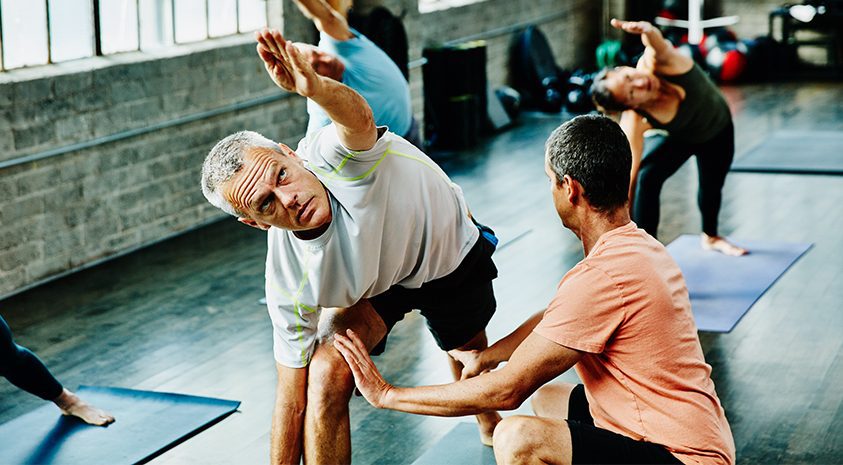Once retired, we can find the time to do the fun activities we have been planning for years. It’s our chance to enjoy the little things and take time for ourselves (finally).
But as you move from a work mentality to a play mentality, it can be all-too-easy to let some good habits slide. Maybe you used to be too busy working to set aside time for exercise, but you got some walking around the classroom in your job as a teacher. Or perhaps you never had time to finish your crosswords in the morning before running to meetings, but solving problems that came up in your office environment kept your mind sharp.
Now that you’re retired, it’s important to find that balance again, and embrace a healthy lifestyle. You finally have the time to enjoy exercise the way you want, or participate in the activities you want to keep your mind sharp. So will you keep up with them? Take a look at these ideas on where to start. Then, make it your own!
Exercises For Your Body
Try Weight-Bearing Exercise
When people think of weight-bearing, they often think of weight-lifting. But that’s not the case! Weight-bearing exercises are exercises where you bear the weight of your own body. Anything where you’re making an impact with the ground and taking steps (even small ones) is a weight bearing exercise. Running and walking are common, but even little things like climbing the stairs give you a good impact, which is necessary for bone health.
Explore some more options like Tai-Chi and yoga to see what weight-bearing exercises are most enjoyable for you.
Try Muscle-Strengthening Exercises
So if weight-bearing exercises mean exercises where you bear your own body weight, then where do the workouts with barbells fit in? Well those are actually muscle-strengthening exercises. And while impact from running or walking can help your bones stay strong, strong muscles help with balance and core support. These are two ways to keep your body fit as you get older. And they can really work together. That’s one reason people love yoga and tai chi—those exercises do double duty by strengthening and toning muscles, while bearing your weight.
Join Group Workout Classes
Staying social is a great way to stay motivated. And it doesn’t hurt that staying engaged with people can keep your mind sharp as well. Consider joining a walking group, or signing up for aerobics at a local gym. If going into it alone sounds intimidating, bring a friend! As you advance, it can become almost like a version of a book club—but for keeping your body healthy.
Enjoy Outdoor Activities
Staying physically fit doesn’t just mean scheduling time at the gym. Participating in activities like gardening can be a great way to get a workout in while doing something you love. Don’t think gardening counts as exercise? It turns out gardening can burn over 300 calories an hour.1 And that makes sense—think of all the hoeing, raking, clipping. Not to mention the weight of hauling a wheelbarrow or pushing a lawnmower! Plus, your whole body gets a good workout just from getting up and down to weed or prune. Other outdoor activities like hiking, or even playing tennis offer the same kinds of benefits. Look for a workout in anything you love to do!
Exercises For Your Mind
Stay Sharp with Skill Games
Keeping your edge after retiring requires a little bit of brain work each day. Without daily tasks you need to accomplish, it might be easy to let a bit too much TV-watching creep in. But by enjoying a puzzle, memory game, or even arts and crafts, you can have some fun while giving your mind a little extra challenge.
Explore things like:
– crosswords or sudoku puzzles
– trivia games
– memory games
– card games
– Scrabble
Head Back to School
It isn’t too late to start learning something new! While you may not have the interest in starting on a college degree, you can still take classes. Some colleges let people—especially seniors—audit, or sit-in on, classes for free without earning the credit.
There are also lots of continuing education programs with certificates that are based around hobbies or skills—things like jewelry making, pottery, woodworking, and more. You may consider some extra classes by a personal teacher. Maybe you could take up painting or join a writing workshop and work on a novel or short story.
Turn Your Hobby into Income
You may have picked up some new hobbies in the last year. Or maybe you took a pottery class in school years ago, and you want to try it again. Perhaps you explored some of those continuing education classes we just talked about, and found that you love painting murals! In retirement, the doors are finally open to explore activities you once loved, or even try new things.
Most hobbies have some kind of cost involved. Golf and tennis have club fees and expensive equipment, and woodworking has specialty tools. But where you probably won’t make much from your golfing trips, your craft work hobbies could just pay for themselves. Consider reaching out to local arts organizations and seeing if they would be willing to sell your work. Or consider arts fairs—or even online! Leatherworking, woodturning, pottery, painting… these are all hobbies that can actually earn some money.
Try Out Video Games
Most people haven’t traditionally thought of video games as a brain building activity, and they definitely haven’t thought of them as the activities older adults might enjoy. But the truth is, the latest group of retirees probably spent much of their career learning and using computers and technology. And while video games can be simply entertainment, many new games involve problem solving and dynamic storylines.
Remember, it isn’t just computer games or expensive consoles. There are plenty of free apps for your phone that will allow you to play games that require memory. The New York Times crossword puzzle even has an app.
Retirement Doesn’t Have To Mean Slowing Down
Once you’re retired, you won’t have to worry about job responsibilities or trying to find the time to do things you love. But that doesn’t mean it’s time to sit back and while away your time, either!
Jumping into a hobby to keep your mind sharp, or staying active with friends is important, just as one of life’s great joys. Plus, it will help your health, too.
If you’re looking at adding a gym membership, buying some new equipment for a hobby, or even going back to school to take some fun classes, talking to an advisor is a good idea. They’ll help you understand where your money works in retirement. Contact a Bankers Life agent today and start planning a happy—and healthy—retirement.
This material provides general information about the described insurance product(s) for educational purposes only. This is not intended as investment advice or to recommend the insurance product(s).
The Company and its producers do not provide legal or tax advice. Each individual should seek specific advice from their own tax or legal advisors. The general and educational information presented in this material is a sales and marketing piece for insurance products offered by Bankers Life and Casualty Company.



